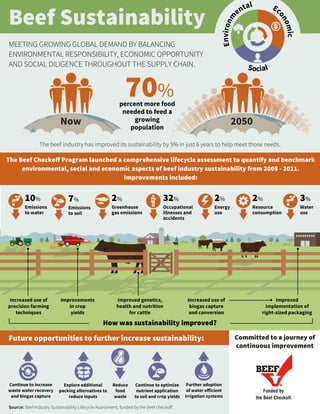Beef Sustainability
•
4 recomendaciones•36,509 vistas
Meeting growing global demand by balancing environmental responsibility, economic opportunity and social diligence throughout the supply chain.
Denunciar
Compartir
Denunciar
Compartir
Descargar para leer sin conexión

Recomendados
Más contenido relacionado
La actualidad más candente
La actualidad más candente (20)
La maduración, su control y la cosecha de la caña de azúcar 1982 (2)

La maduración, su control y la cosecha de la caña de azúcar 1982 (2)
Small-Scale Cricket Farming in Ban Hathviangkham, Laos

Small-Scale Cricket Farming in Ban Hathviangkham, Laos
The role of livestock in food and nutrition security

The role of livestock in food and nutrition security
Genetic improvement of small ruminants in Ethiopia have failed and need re-think

Genetic improvement of small ruminants in Ethiopia have failed and need re-think
Destacado
Business intelligence social. ¿Cómo aprovechar al máximo las redes sociales?

Business intelligence social. ¿Cómo aprovechar al máximo las redes sociales?UOC Universitat Oberta de Catalunya
Destacado (20)
Steak - The Opportunity Ingredient for Foodservice

Steak - The Opportunity Ingredient for Foodservice
Life cycle assessment (LCA) of Dairy and beef cattles 

Life cycle assessment (LCA) of Dairy and beef cattles
Business intelligence social. ¿Cómo aprovechar al máximo las redes sociales?

Business intelligence social. ¿Cómo aprovechar al máximo las redes sociales?
Similar a Beef Sustainability
Session 20 kittenah jordan cca health

Session 20 kittenah jordan cca healthInternational Institute for Environment and Development CBA5 Conference Presentations
The inclusion of Leucaena diversifolia in Colombian cattle systems: An econom...

The inclusion of Leucaena diversifolia in Colombian cattle systems: An econom...Tropical Forages Program
Similar a Beef Sustainability (20)
Sustainable Agriculture as Solution to Global Challenges

Sustainable Agriculture as Solution to Global Challenges
Sponsor Day on animal feeding: Carbon Footprinting of Animal Nutrition

Sponsor Day on animal feeding: Carbon Footprinting of Animal Nutrition
Science-fiction or science-fact? Research for sustainable livestock agri-food...

Science-fiction or science-fact? Research for sustainable livestock agri-food...
The inclusion of Leucaena diversifolia in Colombian cattle systems: An econom...

The inclusion of Leucaena diversifolia in Colombian cattle systems: An econom...
THE EU RESEARCH & INNOVATION PROGRAMME 2021 – 2027

THE EU RESEARCH & INNOVATION PROGRAMME 2021 – 2027
Eco-Intensification - the science of organic farming: A guide to climate resi...

Eco-Intensification - the science of organic farming: A guide to climate resi...
Último
CHEAP Call Girls in Saket (-DELHI )🔝 9953056974🔝(=)/CALL GIRLS SERVICE

CHEAP Call Girls in Saket (-DELHI )🔝 9953056974🔝(=)/CALL GIRLS SERVICE9953056974 Low Rate Call Girls In Saket, Delhi NCR
Último (20)
CHEAP Call Girls in Saket (-DELHI )🔝 9953056974🔝(=)/CALL GIRLS SERVICE

CHEAP Call Girls in Saket (-DELHI )🔝 9953056974🔝(=)/CALL GIRLS SERVICE
Schema on read is obsolete. Welcome metaprogramming..pdf

Schema on read is obsolete. Welcome metaprogramming..pdf
BPAC WITH UFSBI GENERAL PRESENTATION 18_05_2017-1.pptx

BPAC WITH UFSBI GENERAL PRESENTATION 18_05_2017-1.pptx
Call Girls Indiranagar Just Call 👗 7737669865 👗 Top Class Call Girl Service B...

Call Girls Indiranagar Just Call 👗 7737669865 👗 Top Class Call Girl Service B...
Call me @ 9892124323 Cheap Rate Call Girls in Vashi with Real Photo 100% Secure

Call me @ 9892124323 Cheap Rate Call Girls in Vashi with Real Photo 100% Secure
Accredited-Transport-Cooperatives-Jan-2021-Web.pdf

Accredited-Transport-Cooperatives-Jan-2021-Web.pdf
Delhi Call Girls Punjabi Bagh 9711199171 ☎✔👌✔ Whatsapp Hard And Sexy Vip Call

Delhi Call Girls Punjabi Bagh 9711199171 ☎✔👌✔ Whatsapp Hard And Sexy Vip Call
VIP Model Call Girls Hinjewadi ( Pune ) Call ON 8005736733 Starting From 5K t...

VIP Model Call Girls Hinjewadi ( Pune ) Call ON 8005736733 Starting From 5K t...
Invezz.com - Grow your wealth with trading signals

Invezz.com - Grow your wealth with trading signals
Digital Advertising Lecture for Advanced Digital & Social Media Strategy at U...

Digital Advertising Lecture for Advanced Digital & Social Media Strategy at U...
Cheap Rate Call girls Sarita Vihar Delhi 9205541914 shot 1500 night

Cheap Rate Call girls Sarita Vihar Delhi 9205541914 shot 1500 night
Delhi Call Girls CP 9711199171 ☎✔👌✔ Whatsapp Hard And Sexy Vip Call

Delhi Call Girls CP 9711199171 ☎✔👌✔ Whatsapp Hard And Sexy Vip Call
Call Girls in Sarai Kale Khan Delhi 💯 Call Us 🔝9205541914 🔝( Delhi) Escorts S...

Call Girls in Sarai Kale Khan Delhi 💯 Call Us 🔝9205541914 🔝( Delhi) Escorts S...
Generative AI on Enterprise Cloud with NiFi and Milvus

Generative AI on Enterprise Cloud with NiFi and Milvus
Beef Sustainability
- 1. MEETING GROWING GLOBAL DEMAND BY BALANCING ENVIRONMENTAL RESPONSIBILITY, ECONOMIC OPPORTUNITY AND SOCIAL DILIGENCE THROUGHOUT THE SUPPLY CHAIN. Committed to a journey of continuous improvement Greenhouse gas emissions 2% Water use 3% Emissions to soil 7% Energy use 2% Occupational illnesses and accidents 32% Emissions to water 10% Resource consumption 2% Beef Sustainability Ec onomic Environm ental Social Future opportunities to further increase sustainability: Source: Beef Industry Sustainability Lifecycle Assessment, funded by the beef checkoff Reduce food waste Continue to increase waste water recovery and biogas capture Further adoption of water efficient irrigation systems Continue to optimize nutrient application to soil and crop yields Explore additional packing alternatives to reduce inputs Increased use of precision farming techniques Improvements in crop yields Improved genetics, health and nutrition for cattle Improved implementation of right-sized packaging Increased use of biogas capture and conversion How was sustainability improved? percent more food needed to feed a growing population Now 2050 70% The Beef Checkoff Program launched a comprehensive lifecycle assessment to quantify and benchmark environmental, social and economic aspects of beef industry sustainability from 2005 - 2011. Improvements included: The beef industry has improved its sustainability by 5% in just 6 years to help meet those needs.